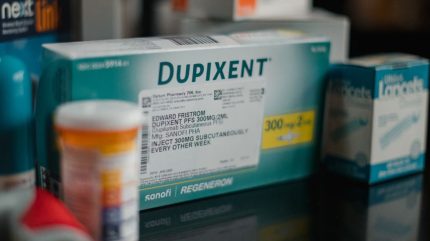
Sanofi and Regeneron’s blockbuster biologic Dupixent (dupilumab) is poised for yet another label expansion, this time for the rare autoimmune skin disorder bullous pemphigoid (BP).
The US Food and Drug Administration (FDA) has accepted a supplemental biologics licence application (sBLA) for priority review, with a decision expected by 20 June 2025. If approved, Dupixent would become the first and only targeted treatment for BP, which currently has no FDA-approved therapies.

Discover B2B Marketing That Performs
Combine business intelligence and editorial excellence to reach engaged professionals across 36 leading media platforms.
BP causes large, fluid-filled blisters – primarily in elderly adults – as the immune system mistakenly attacks proteins in the skin’s basement membrane, leading to inflammation and skin separation. The current standard of care (SOC) is corticosteroids such as prednisone, which help manage symptoms but carry significant side effects, including weight gain, high blood sugar, and mood changes.
The FDA’s review is based on data from the Phase II/III LIBERTY-BP ADEPT trial (NCT04206553), which evaluated Dupixent’s efficacy in BP patients. In the 106-patient study, those receiving 300mg of Dupixent every two weeks achieved a fivefold higher rate of sustained disease remission (20%) compared to placebo at 4%. Remission was defined as a complete clinical response after tapering off SOC oral corticosteroids by week 16, with no relapses or rescue therapy required over the 36-week trial period. Dupixent also demonstrated superiority over placebo in reducing disease severity and clinically meaningful itch, among other secondary endpoints.
Dupixent, a fully human monoclonal antibody, inhibits the signalling of interleukin-4 (IL-4) and interleukin-13 (IL-13) pathways, two of the key drivers of type 2 inflammation. It is already approved across six indications in the US including atopic dermatitis, asthma and chronic obstructive pulmonary disease (COPD).
Sanofi reported in its Q4 2024 results that Dupixent surpassed its €13bn ($13.6bn) sales target for the full year, reaching $14.15bn sales. According to GlobalData’s Pharma Intelligence Center, the drug is expected to generate $25bn in global sales by 2030.

US Tariffs are shifting - will you react or anticipate?
Don’t let policy changes catch you off guard. Stay proactive with real-time data and expert analysis.
By GlobalDataGlobalData is the parent company of Pharmaceutical Technology.
Despite the commercial success, tensions between Regeneron and Sanofi have escalated. Late last year, Regeneron filed a lawsuit against its longtime partner, alleging that Sanofi withheld key commercialisation details in violation of their agreement. Specifically, Regeneron claims Sanofi refused to share pharmacy benefit manager (PBM) contracting information for Dupixent, allegedly to avoid disclosing bundling arrangements with other immunology drugs. The lawsuit, initially filed in November 2024 and amended in December, surfaced publicly earlier this month (February 2025) through Regeneron’s annual SEC filing.
Regeneron and Sanofi have collaborated on Dupixent since 2007, when they first partnered on the drug’s development and commercialisation. Despite the ongoing lawsuit, Dupixent remains a critical asset for both companies. Regeneron is seeking declaratory judgment, injunctive relief, and damages. In 2024, it became Regeneron’s top-selling product, beating its blockbuster eye franchise Eylea (aflibercept).




